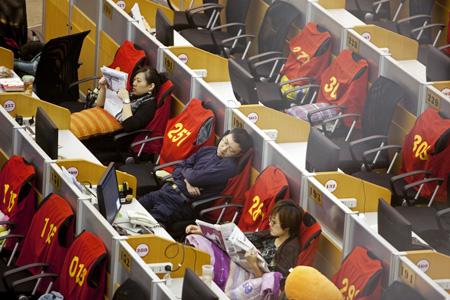
Traders look through periodicals or take a nap at the Shanghai Futures Exchange. The exchange started trading lead futures on March 24. [Photo / Agencies]
DALIAN, Liaoning - A surge in mergers and acquisitions (M&As) of global financial exchanges will not happen in Asia during the next three to five years, despite a wave of worldwide cross-border cooperation, according to officials and analysts.
The worldwide trend for M&A between large exchange companies should cease immediately because excessive activity will only lead to monopolies and the reduction of fair competition, said Meyer Frucher, vice-chairman of NASDAQ OMX Group Inc, on Wednesday in Dalian, Liaoning province.
Phupinder Gill, president of CME Group - one of the world's biggest derivatives and futures exchanges - said that in Asia large exchange companies prefer cooperation in areas such as technology and management systems, rather than engaging in M&A,
Gill said that in Europe, NYSE Euronext Group may approve an M&A plan with Deutsche Boerse AG when the the NYSE Euronext board votes on Thursday. However, in North America, it's unlikely that there will be further plans for consolidation between global exchanges.
For Chinese exchanges, the main aim at present is to create more financial institutions and help the economy to achieve stable growth, said Jiang Yang, assistant to the chairman of the China Securities Regulatory Commission.
"China's financial derivatives market is still in the preliminary stage in that we trade only 26 kinds of futures now," said Jiang. "We encourage cooperation between global exchange companies in sharing experience and advanced risk-control technology, all of which will be helpful in launching new financial tools."
By the end of June, the total transaction value of futures in the Chinese market reached 67 trillion yuan ($10.36 trillion), which is likely to make the country the world's largest futures market by transaction value this year, according to Jiang.
However, this is not the right time for Chinese exchanges to consider M&A activity, at least for the next three years, because the financial derivatives markets currently play a very limited role in the real economy, said Liu Xingqiang, president and CEO of the Dalian Commodity Exchange.
Chinese exchanges will work together to accelerate the introduction of commodity options and new types of futures, which will help enterprises to better hedge their risks, said Liu.
The Shanghai Futures Exchange - one of China's 'big four' commodity exchanges - started trading lead futures on March 24. Coke futures were introduced by the Dalian Futures Exchange on 15 April.




